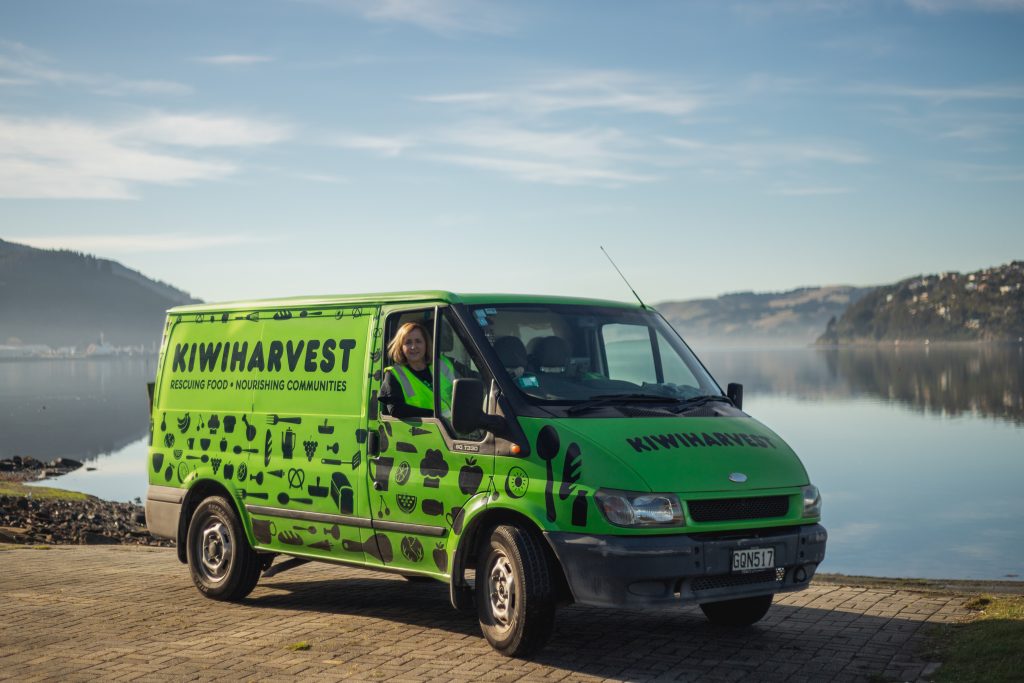Demand surges as KiwiHarvest celebrates a decade of doing good
New Zealand’s largest food rescue organisation, KiwiHarvest, is celebrating 10 years of operation this year, having distributed 7.5 million kgs of food to communities in need (the equivalent to 21.6 million meals) and diverted 20 million kgs C02-equivalent from landfill, since its inception.
Across its five branches, it has 276 active food donors, and services 227 recipient organisations, providing food support to over 33,500 individuals per week.
Achieving that level of scale and substance has been no easy task. KiwiHarvest was established in Dunedin in 2012, initially as FoodShare by Deborah Manning, when she was inspired by two articles in her local newspaper – one about dumpster diving and the other about food insecurity.
“I’m profoundly grateful to everyone who has joined our journey over the last ten years. Our story shows what can be achieved when people share a common goal. We can make people’s lives shine a bit brighter through the power and mana of nutritious kai and treating and respecting our land as taonga,” says Manning.

The demand for KiwiHarvest’s services has grown exponentially due to the pandemic. In the past 24 months alone, KiwiHarvest rescued 3.9 million kgs of food, nearly half (47%) of its total 10 year volume.
Gavin Findlay, KiwiHarvest CEO, says, “At the start of each lockdown, many food businesses chose to donate food that could no longer be sold. Donations from events companies, caterers and retail organisations provided much-needed support to those struggling in the wake of the pandemic.
“Although we saw an increase of food donations in 2020, this has since declined due to supply chain issues and less food in circulation. The demand from our recipient agencies, however, also continues to increase, and we still have a waiting list of organisations wishing to become a recipient. There are still areas in the country which are struggling to be supported and we’re actively looking at where we may be able to help in these areas.”
“It’s been an incredible journey and testament to Deborah’s vision that KiwiHarvest has grown into the fantastic organisation it is today. We’re really proud of what we’ve achieved and we’re not going to rest on our laurels – who knows where the next 10 years will take us,” concludes Findlay.
Highlights from the past ten years:
- Protein sources are the most commonly sought after food item amongst KiwiHarvest’s recipient agencies. As meat can be frozen, there is a shortage of surplus protein items.
- Staple items including canned food, dried pasta, rice and long life milk are also often requested and can be easily stored.
- Fresh produce (3.46 million kgs) makes up nearly half (46%) of the total food rescued, followed by grocery (1.1 million kgs).
- KiwiHarvest’s first collection weighed 7kgs. Its largest collection in one day weighed 41,681 kgs.
- Last year, KiwiHarvest launched its Invercargill branch to address the growing need for food support in the Southland region.
- KiwiHarvest collaborates with OzHarvest to provide food rescue services and volunteering opportunities to businesses throughout Australasia.
- KiwiHarvest’s first van was donated by a local car dealer in Dunedin when Deborah drove her small hatchback (overfilled with rescued food) into the forecourt. The owner donated a van which is still in service today, collecting and distributing food around the Dunedin region.
- Deborah initially operated KiwiHarvest in her garage, using a donated fridge/freezer. When she was donated one tonne of onions, she realised she needed to find a more permanent home to house rescued food as the smell of onions took several weeks to leave her garage. She was fortunate to have support from local businesses and council who offered space.
Total Food Rescued / Donated In Weight (kg) by food category
| Total Bakery (kg) | 866,386.42 |
| Total Beverages (litres) | 306,246.61 |
| Total Dairy (kg) | 633,040.70 |
| Total Grocery (kg) | 1,120,920.91 |
| Total Meat (kg) | 502,641.50 |
| Total Produce (kg) | 3,468,078.83 |
| Total Ready Meals (kg) | 718,931.37 |
| Total Food In Weight (kg) | *7,616,259.37 |
*There is a slight difference in the ‘Total Food In’ volume and the ‘Food Distributed’ volume as some food is held onto longer.



